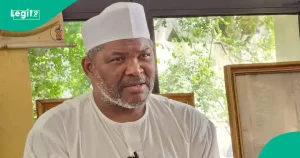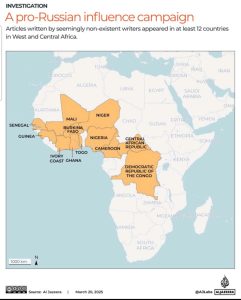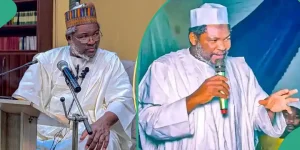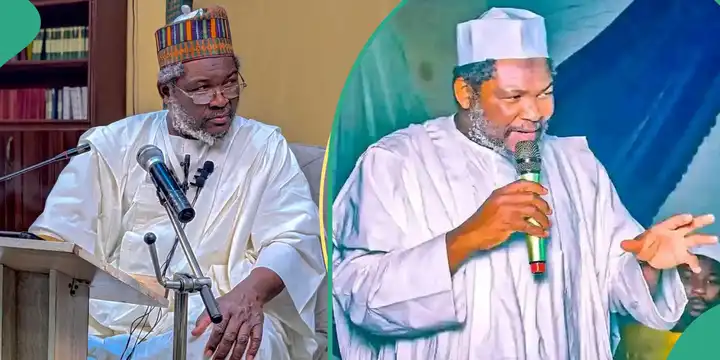By Senator Iroegbu
In an era where falsehoods outpace truth, Nigeria and its Sahel neighbours find themselves on a perilous digital battleground. Disinformation threatens democracy, national security, and social harmony across West Africa. False narratives, amplified by social media and coordinated networks with ties to external powers, undermine elections, stoke ethnic tensions, and corrode public trust in democracy and institutions.
As Nigeria approaches the 2027 elections, this menace has assumed sharper geopolitical contours. External powers and their allies in the Sahel have weaponised information to justify coups, weaken democracies, and polarise opinion. Yet the most potent antidote to this weaponised falsehood may not lie in new laws or sophisticated algorithms—it may reside in the pulpit, the minaret, and the palace.
Last month in Kano, a historic moment unfolded. Sheikh Ibrahim Khalil, Chairman of the Kano State Council of Ulama, declared that spreading fake news is a sin in Islam, equating it with fabricating lies—an act forbidden by the Qur’an. “Islam forbids the fabrication of lies. Therefore, creating and spreading fake news is prohibited,” he said. He made this declaration at a two-day fact-checking workshop organised by Alkalanci, a Hausa-language platform dedicated to countering misinformation. The event, attended by Islamic scholars, imams, and representatives of His Highness, the Emir of Kano, Muhammad Sanusi II, was more than a media literacy session—it was a moral awakening.
Representing the Emir, Alhaji Abbas Dalhatu reminded participants that even Prophet Suleiman verified reports before acting, as recorded in the Qur’an. The message was unmistakable: truth verification is not a Western construct but a divine injunction. This gathering reframes the battle for truth as a moral, civic, and spiritual duty, placing religious and traditional leaders at the heart of national resilience.

Religious and traditional leaders—imams, pastors, and traditional rulers—wield immense influence across Nigeria and West Africa. When they speak, millions listen. Their voices reach deeper into citizens’ hearts than any government circular or press release could. Harnessing this moral authority to promote truth, critical thinking, and responsible information sharing could be transformative. Imagine Friday sermons and Sunday homilies urging congregants to verify stories before forwarding them. Picture traditional rulers collaborating with fact-checking organisations to dispel rumours before they ignite conflict. This approach fuses cultural authenticity with digital resilience—a uniquely African response to a global problem. By rooting fact-checking in faith and tradition, truth becomes not just a civic virtue but a sacred obligation.
Across the Sahel, disinformation has evolved into a weapon of war. In Mali, Burkina Faso, and Niger, false narratives spread through encrypted platforms and foreign-funded networks have justified coups, vilified democratic institutions, and fostered hostility toward neighbouring states like Nigeria and ECOWAS. These campaigns, often orchestrated by external actors seeking geopolitical leverage, prey on citizens by exploiting anti-Western sentiments, poverty, and religious/ethnic mistrust. Left unchecked, they could destabilise Nigeria’s fragile unity and sow doubt ahead of the 2027 elections. This is not just Nigeria’s problem—it’s regional. A coordinated response based on the Kano Model could combat this epidemic of falsehood and ensure stability across the Sahel.


Nigeria’s most effective response must mobilise faith-based and traditional networks. The Kano initiative offers a blueprint for building collective immunity against falsehood. To protect democracy and stability, Nigeria must replicate the model nationwide by conducting fact-checking and media literacy workshops for clerics, traditional and youth leaders, ensuring that religious and cultural figures become trusted guardians of truth. Media literacy should be institutionalised by integrating digital ethics and information verification into religious education, civic studies, and community training so truth-telling becomes as routine as prayer or civic duty. Collaboration with fact-checking platforms must deepen to debunk falsehoods in local languages, ensuring truth reaches the grassroots. Promoting responsible digital citizenship is equally vital—citizens must learn to pause, verify, and reflect before sharing information online, understanding that misinformation is not only harmful but sinful and unpatriotic.
Our fight against disinformation cannot be a one-time effort, and we must be prepared to adapt our strategies as the threat evolves. We must continuously educate Nigerians on the geopolitical dimensions of disinformation and strengthen independent media. By doing so, we can ensure that our citizens are informed, vigilant, and far harder to manipulate.
The lessons from Kano are not just for Nigeria. They resonate across West Africa, where democracies face similar vulnerabilities. The region’s stability depends on its ability to immunise citizens against the poisons of falsehood. By anchoring truth in spiritual and communal values, Nigeria can lead a regional movement where faith becomes the firewall against foreign propaganda and internal division. This is a battle we must fight together, and the clerics of Kano have shown us the way.
Sheikh Khalil’s pronouncement transforms the fight against fake news from a technical challenge into a moral crusade. When verification becomes worship and fact-checking becomes an act of faith, information warfare meets an adversary it cannot easily defeat: the human conscience guided by truth. The workshop in Kano may have seemed modest—a few dozen clerics gathered for two days—but history often turns on such quiet revolutions. By awakening moral authorities to the dangers of disinformation, it has lit a spark that could protect not only Nigeria’s democracy but also the integrity of the entire Sahel.
As the 2027 elections approach and the Sahel remains unstable, the task before Nigeria’s leaders—political, religious, and traditional—is straightforward. This is not merely about regulating speech or policing the internet; it is about defending truth itself, the foundation upon which democracy, peace, and unity stand. The clerics of Kano have shown the way. The question now is whether the rest of Nigeria—and indeed West Africa—will follow. The battle for truth has found its warriors. May their voices multiply.
Senator Iroegbu is a security, geopolitics and development analyst. Email: Senator.iroegbu@yahoo.co.uk

